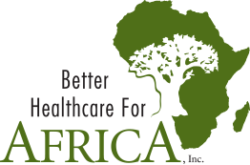All three flights – Columbus to Washington, Washington to Addis Ababa, Addis to Harare – went well. As planned, I met Luke Hingson, president of Brother’s Brother Foundation, and Mary Mahlie, executive director and CEO of Hospital Sisters Mission Outreach, at the gate for the flight to Addis. When we went to pick up our bags at Harare International Airport our luck changed. I had three bags, a suitcase and two duffle bags with donated medical supplies. One of the duffles didn’t make it on the plane and was back at Addis. It would arrive the next day at 1:30, I was told. An Italian doctor and some students accompanying him on a volunteer mission to Louisa Giotti Mission Hospital in northeast Zimbabwe experienced the same problem. Our group, at least, was scheduled to work out of Harare for a few days.
We next took our remaining bags through customs, where, after lengthy and frustrating discussion, we were told we lacked the proper paperwork to bring in donated medical supplies. Anyone who plans on carrying donated medical supplies into Zimbabwe should have three documents to obtain customs clearance. Even better, send the documents to the receiving institution ahead of time and have that institution submit them to customs to obtain the duty-free certificate before you arrive. If the person meeting you has that certificate, you should have no problem passing through customs. These three documents are:
- A letter of donation on your institution’s letterhead stating that the supplies are a donation to [name of the institution] and are not for resale;
- An invoice on letterhead stating the estimated value of the donated supplies (do not state that the items have no value because customs will wonder why you are bringing items of no value);
- A packing slip on letterhead listing the contents.
Note that goods with an expiration date should have at least a year of shelf life at the time you bring them in.
Do not bring in drugs. Their clearance procedure is much more involved.
In Zimbabwe many mission hospitals work through the Zimbabwe Association of Church-related Hospitals (ZACH) to clear supplies through customs, including entire container shipment (ZACH received nearly 370 containers in 2010).
Dr. Elizabeth Taria, director of St. Albert’s Mission Hospital and director of the Catholic Bishops Conference Health Commission, met us at the hospital and we left the airport a good two hours after arrival and several bags short. We spent that afternoon and night at Elizabeth’s. That afternoon and evening we tried to call up the internet with little success. I eventually was able to get into Gmail, the simpler HTML version, but I could not access the BHA website. BTW, I picked up the lost duffle on Wednesday, the earliest our schedule would permit. It was safe and fine.

Hello Dr Vysheslavtsev and thank you for your comment. Would you like to work at a hospital as a temporary volunteer or are you thinking of moving back to Zimbabwe to live and work full time at a hospital? The skills of an orthopaedic surgeon are greatly needed at St. Albert’s and other mission hospitals there. Dr Elizabeth Tarira, director of St. Albert’s, said the problem is that hospitals do not have the U.S. dollars to pay a salary. But if you go temporarily as a volunteer physician, and you have funding to support yourself while there, your help will be much appreciated. If that is the case, please let me know. And if you return to Zimbabwe to live full time, please write again and let us know how you are doing. Best of luck…Darrell